Choose one thing for the rest of your life, just to inherit and cast ingenuity - the intangible cultural heritage project ""Sugudu" production skills" and its provincial inheritors and Zhanhuan
The sun in Lijiang at noon is always unstoppable. Although it is still spring, the hot sun shines directly on the body, making people sweat and have nowhere to hide. As usual, He Zhanhuan started hand-making "Sugudu" musical instruments in a humble workshop. He has been sticking to such a production scene for most of his life!
It takes at least half a month to make a simple and elegant "sugudu" musical instrument from a single piece of wood, and to make a ring. Decades of production have made hundreds of "Sugudu" musical instruments stand out one by one through his hands, and have become hand-made ancient instruments that are very popular among ethnic folk musicians.
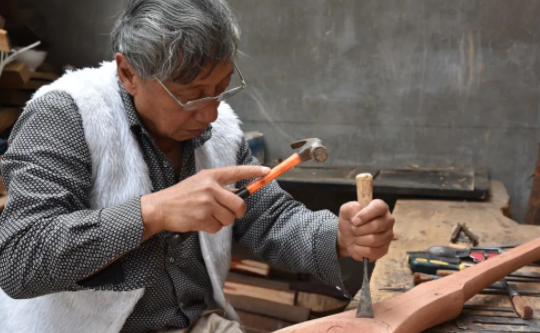
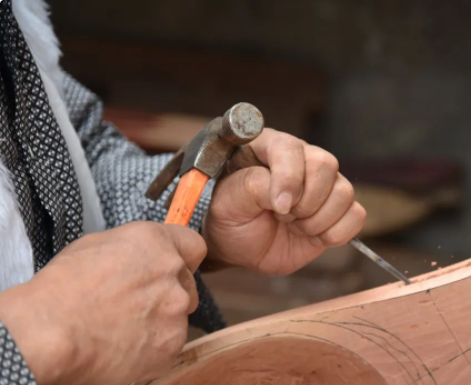
The "Huobusi" lost by the Mongolians 800 years ago became the "Sugudu" of the Naxi people
"I remember that more than 30 years ago, Bato, the conductor of the Inner Mongolia Orchestra, came to his home and expressed his surprise that the ancient musical instruments of 'Sugudu' were preserved in the Naxi area of Lijiang. .' At that time, Bato bought a 'Sugudu' ancient musical instrument and went back, saying that he should compare the historical data map." He Zhanhuan recalled.
"Sugudu" is an ancient four-stringed plucked instrument that survived among the Naxi people in Lijiang. According to historical records, "Sugudu" was originally a musical instrument in the Western Regions, and was used by the "Hui" (he) people in Xinjiang before the ninth century AD. "The History of the Yuan Dynasty" records: "The fire does not think, it is made like a pipa, with a straight neck, no frets, a small groove, a round belly like a half-bottle ke (ke), with skin as the surface, four strings, skin stretches, the same Orphan." The "Sugudu" preserved in Lijiang is basically consistent with the above records. "Huobusi", also known as Hubosi, Hunbusi, Amber words, etc., are all transliterated from Turkish, and are commonly known as Hubo among Lijiang folks.
According to legend, "Sugudu" was one of the musical instruments in the Western Regions that Kublai Khan brought to Lijiang with military musicians during his southern expedition to Dali at the end of the Song Dynasty. At first, it was only used in the performance of the Naxi customary funeral and sacrificial ritual suite "Baisha Fine Music", and it was only quoted by the Lijiang Dongjing Band around the end of the Qing Dynasty and the beginning of the Republic of China. The earliest relevant records in local documents can be found in the "Hu Piao Ci" of Lijiang Tuyi Mu Gao in the Ming Dynasty: "The cheese wine cake group feast for Khan, the four strings are very sad. If Zhaojun's grievance is about to pop up, no one will cry immediately. It can be seen that the musical instrument "Sugudu" has been circulated among the Naxi people at least in the Ming Dynasty.
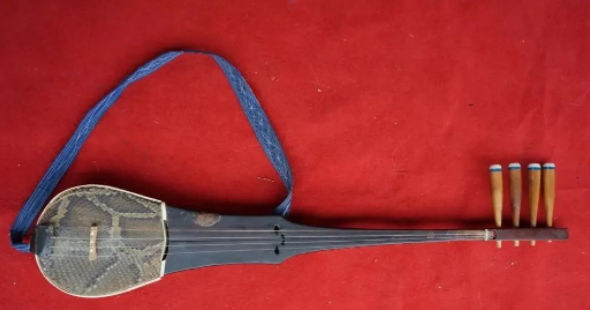
According to reports, the structure of "Sugudu" can be divided into headstock, body, upper resonance box, lower resonance box, string groove, string Zhen, mountain pass, string, upper sound hole, lower sound hole, membrane, piano code , at the string, etc. To make "sugudu", it is necessary to carve and polish a whole piece of wood with a length of about 1.1 meters, a width of about 20 centimeters and a thickness of about 7 centimeters. The craftsmanship is roughly the same as that of ordinary woodworking, but the production technique of the upper resonance box has its special features: that is, it cannot be carved from the front opening, but needs to be cut from the right side with a length of about 17 cm and a width of about 2 cm. Use a chisel to hollow out the inside without hurting its face. Then seal the opening with a wooden strip equidistant from the opening. Finally, the process of digging the string groove, wrapping the film, sticking the piano code, winding the string, and tying the string is completed. Lijiang's "Sugudu" still retains the traditional production method, tuning system, performance skills and special performance charm. Its shape and playing techniques are only found in the Naxi area.
The rural and mountainous areas of Lijiang are rich in walnuts, and walnut wood is a good material for making "sugudu". As for the origin of the name "Sugudu", listen to He Zhanhuan's introduction. When Mr. Li Chenggan taught him to make "Sugudu", he said: The wild goose is the totem of the Naxi people, and it is an auspicious thing. An ancient musical instrument named after the call of wild geese - "speed" is "three" in Naxi language; "gudu" is the call of wild geese. In the process of "Sugudu" playing ancient music, one can clearly hear the rhythm and tone of its imitating the sound of wild geese. He Zhanhuan said that in the course of hundreds of years of history, the ancient musical instruments of "Sugudu" have integrated the aesthetic taste and thoughts and feelings of the Naxi people, and endowed her with new life and blood.
"Sugudu" has spread in Xinjiang, Inner Mongolia, Shanxi, Henan, Shaanxi and other places successively after it was introduced into China. All of the above mentioned places have been lost since the Qing Dynasty, and only survived among the Naxi people in Lijiang. This miracle provides valuable material for the study of the history of Chinese music and the development of musical instruments, and has important historical and cultural value. He Zhanhuan introduced that the ancient musical instrument "Sugudu" was displayed in the National (Beijing) History Museum and the Yunnan Provincial History Museum in the early days of the founding of New China.
In 2017, the craftsmanship of "Sugudu" was included in the fourth batch of intangible cultural heritage list of Yunnan Province.
The 8-year-old boy realizes the "Dream of Ancient Music", and the "Sugudu" has a new inheritor
It is indeed a blessing that the ancient musical instruments of "Sugudu" have been preserved and passed down in the Naxi area of Lijiang, thanks to Lijiang's unique geographical location and folk customs. "Lijiang is located in the plateau area of northwest Yunnan. In the past, the traffic here was blocked and there was little contact with the outside world. At the same time, the folk customs were simple, the society was stable, and there were almost no major wars. In addition, there were folk orchestra organizations that existed among the people for a long time-- These factors have created unique conditions for the protection and inheritance of national folk music culture." He Zhanhuan said.
Speaking of the provincial inheritor and Zhanhuan of the "Sugudu" production skills, I have to tell the story of his childhood. He Zhanhuan lived in Shigu Bamboo Garden Village when he was a child. "I remember when I was a child, there were ancient music clubs in every village and village. At that time, there were about 40 ancient music bands in Lijiang. Every holiday, or when there were happy events or funerals, the ancient music clubs in the village would play ancient music. Such a scene is unforgettable to this day. ." He Zhanhuan fell in love with ancient music, and the little childlike innocence planted a seed of determination to learn ancient music. At the age of 7, He Zhanhuan began to learn the huqin. At the age of 8, He Zhanhuan entered the ancient music club in the village.
Because the family is poor, there is no money to buy musical instruments, how can you learn ancient music without musical instruments? Poverty gave birth to imagination and courage. The little boy started various attempts, such as pulling the tail of a horse and being kicked by a horse, getting a snake's skin and being bitten by a snake, climbing a telephone pole to find an abandoned wire line and almost falling... Later, at the age of 10, He Zhanhuan finally made a simple Huqin. Since then, he has been unstoppable and embarked on the path of hand-made musical instruments.
When He Zhanhuan was 24 years old, he began to try to make his own "sugudu" - an ancient musical instrument that he loved and always wanted to own. He Zhanhuan, who has a foundation in carpentry, wanted to "paint a scoop according to the gourd" to complete this attempt, but it turned out that things were not as simple as he thought. "In the process of my own continuous exploration, I was fortunate to meet the guidance of 'superior', one is Mr. Li Chengqian from Dayan Naxi Ancient Music Club, and the other is Mr. Mu Zhu from Baihua Ancient Music Club. The craftsmanship of making 'sugudu' has taught me nothing left, and I have avoided detours."
He Zhanhuan got his musical enlightenment as a child and tried to make musical instruments by hand, and then he was admitted to the former Lijiang Normal School with a major in music. After graduation, he was assigned to the former Lijiang County National Song and Dance Troupe. This process allowed the "Sugudu" production skills to find a new inheritor, and provided professional knowledge and technical support for the continuous improvement of this ancient instrument in the future.
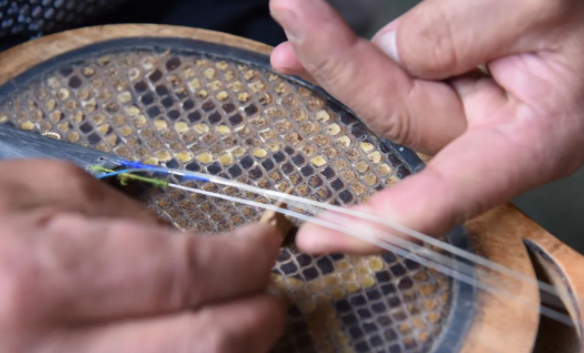
He Zhanhuan found that the instruments he made had shortcomings such as dull tone, poor sensitivity, and backward craftsmanship. "The sound of playing 'Sugudu' on a cloudy day is very dull, and sometimes there is no sound." In order to improve the shortcoming that "Sugudu" will lose its voice when it is cloudy, He Zhanhuan started a new attempt - reformation" Fast Gudu". In the process of repeated improvement, Hezhanhuan came up with his own ideas: on the basis of maintaining the traditional shape, applying modern advanced technical means, made a series of ancient musical instruments such as "Sugudu" and "Pipa" into traditional and modern, The image and timbre are relatively unified, and it is a musical instrument with obvious Naxi characteristics. Later, on the basis of retaining the tradition, the "Sugudu" produced by He Zhanhuan expanded the main speakers and sub speakers, lengthened the piano rod and headstock, especially the python skin was treated with two degrees of skinning, which enhanced the The stability of the surface makes it less affected by the weather, so that the strings can fully vibrate, increasing their volume and penetration. Now, He Zhanhuan has a new idea. He intends to further transform this plucked instrument into a plucked and plucked instrument... In this way, on the way of inheritance, he has been learning, exploring and Improvement, unknowingly, is half a lifetime in the blink of an eye.
He Zhanhuan said that in addition to playing 24 Naxi ancient music, the "Sugudu" ancient instrument can also play modern music. Hezhanhuan and the ancient musical instrument "Sugudu" are inseparable both emotionally and professionally. Over the years, he has participated in various exhibitions and performances with the ancient musical instruments of "Sugudu", and has won many awards. In 2019, he was deeply impressed by the two "Sun Bird 'Inheritance and Ingenuity' Awards" won in the "Chinese National Musical Instrument Traditional Skills Competition" event at the main venue of the 7th China Chengdu International Intangible Cultural Heritage Festival International Intangible Cultural Heritage Expo Park. Glad - his life-long "Sugudu" production skills and playing techniques have been internationally recognized.
In 2019, Hezhanhuan was announced by the Yunnan Provincial Department of Culture and Tourism as the provincial representative inheritor of the provincial-level intangible cultural heritage project "Sougudu" Production Skills.
The ancient musical instrument "Sugudu" played at the ancient concert has become a "rare treasure" that attracts the attention of foreigners
Dayan Naxi Ancient Music Club is a business card of Lijiang and a window for Lijiang to promote its national culture to the outside world. The ancient music club is known as the "Three Ancients" because of "the ancient music, the ancient instruments, and the old musicians who played it". In the early 1980s, the Dayan Naxi Ancient Music Club had already become famous, and it attracted many foreign guests.
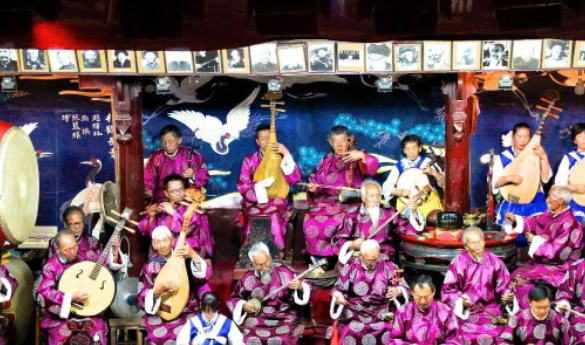
He Zhanhuan is in charge of the performance of "Sugudu", "Huqin", "Erhu" and other instruments at the Dayan Naxi Ancient Concert. He Zhanhuan, who can play and make "sugudu", naturally becomes a rare character in the eyes of foreigners. The home of He Zhanhuan, located in the old residential area of Xi'an Street in the ancient city, once became a place where foreigners came to visit.
"I remember friends from more than 10 countries including Hungary, Brazil, Germany, France, Japan, etc., who were accompanied by staff from the Lijiang Foreign Affairs Office to their homes. Many of them came to shoot documentaries about the production of ancient musical instruments. As' As the inheritor of the production of Sugudu' ancient musical instruments, there are so many foreign guests who are interested in this national music culture, and they really feel a sense of pride and honor." He Zhanhuan said.
What impressed He Zhanhuan most was the Mongolian people's emotion towards the music culture that has been lost for more than 800 years.
In November 2014, the ancient city organized the old, middle and young ethnic folk musicians to participate in the exhibition activities at the Central Conservatory of Music, and He Zhanhuan was among them at that time. The ancient musical instrument "Sugudu" suddenly attracted the attention of foreign guests. During the break at the performance site, a Mongolian royal family who was studying at the Central Conservatory of Music introduced himself and hoped that He Zhanhuan would have the opportunity to teach "Sugudu" in Mongolia. "Dude" production skills, exchange experience and practices in protecting and inheriting national music culture. Although this visit was not completed, He Zhanhuan deeply felt the Mongolians' obsession with "sugudu" ancient musical instruments and their own national music culture.
He Zhanhuan's home is a place frequented by Inner Mongolian folk music scholars. Since Bato, the conductor of the Inner Mongolian Orchestra, came to visit more than 30 years ago, several groups of Inner Mongolians have come to visit and occupy the ring. In 2021, Zhang Jisheng, an intangible cultural heritage expert from Inner Mongolia, came to visit and bought a few ancient musical instruments of "Sugudu" and brought them back. He sighed and said that "Huobusi", which has been lost for more than 800 years, will be restored to Inner Mongolia. The prairie rings!
Because of protection and inheritance, today, we seem to have heard the ancient sound of the qin resounding on the grasslands of Inner Mongolia... The melodious sound of the qin is integrated into the pictures of "the desert is solitary, the long river is setting the sun" and the wild geese return to the south, becoming a unique frontier fortress unique scenery and style.
Talking about the inheritance of the craftsmanship of "Sugudu", He Zhanhuan said: "The production of 'Sugudu' requires three years of woodworking. Although some people have come to learn it, not many people persist. There are more than seven or eight people who make it. In Inner Mongolia, I heard that it has entered mass production, and it will be good as long as it is passed down."
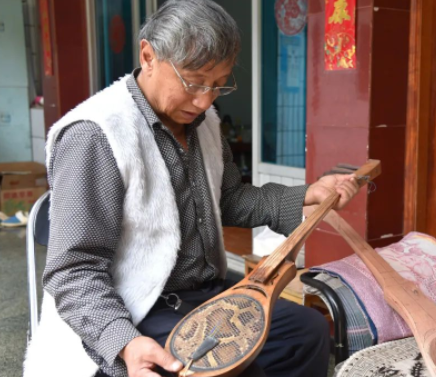
"Choose one thing for the rest of your life, just to pass on your ingenuity." A person's life seems to be long for decades, but in fact, the time to do things is very short. Choose one thing, and do it well for the rest of your life, and never give up no matter what happens on the road. Only in this way can you do things to your satisfaction. This is how He Zhanhuan came.
 渝公网安备 50010702504639号
渝公网安备 50010702504639号